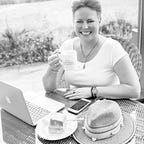Why, just why is this still a thing?
Two books have really frustrated me this year. Usually, reading relaxes or enlightens me, however with these two books I’ve felt so overwhelmingly frustrated I’ve not known whether to rant or cry.
What books have caused this indignation and frustration? ‘Invisible Women’ by Caroline Criado Perez and ‘Biased’ by Dr Jennifer Eberhardt.
‘Invisible Women’ reels off example after example illustrating how product design, medicine, even car safety features are all designed for the average male. We live in a world built for and by men and this bias has had a profound effect on women. Worse, we’re often oblivious to the bias — as we take prescribed medication that has only been tested on males, or sit in a car where the seat belts have been designed for a male adult — assuming these things have undergone rigorous testing and approval processes to protect all humans. Turns out, they haven’t. Women aren’t regarded as 50% of the population, but as outliers. It’s the 21st century folks. There is no excuse. By not adequately including female data, our health and wellbeing is being negatively impacted. It’s well and truly time for change.
Finishing ‘Invisible Women’, I turned to ‘Biased’, and this depressed me even more. At least as a woman I don’t live in fear of being arrested simply for my gender. ‘Biased’, which predominantly focuses on racial bias in America, really brings home just how underrepresented, how unfairly treated and how biased people are to the black community in America. All because of the colour of someone’s skin. Not because of their personality or abilities, just their skin colour. Just by being black, you are less likely to be able to rent a home on Air B&B or be selected for a job interview and are more likely to be pulled over by the police for a routine traffic stop. Where is the justice?
There are some who are destined for an easier life though — those males born into white middle class families. These males will face less scrutiny, less implicit or explicit bias and have more opportunities available to them — all because they happened to be born into the ‘right’ family. However much we intend not to be biased: “Our ideas about race are shaped by the stereotypes to which we are exposed on a daily basis. And one of the strongest stereotypes in American society associates blacks with criminality.”
When I read the research, example after heart-breaking example being reeled off by Caroline and Jennifer, I wondered at humanity. We live in ‘the information age’, fuelled by the ‘knowledge economy’ and yet we can’t get the basics of humanity — treating others as we’d like to be treated, thinking and designing inclusively and rewarding people based on ability rather than prejudged assumptions — right. When will we personally take responsibility, call people out when assumptions are made and collectively work together for the betterment of humankind, not mankind?
